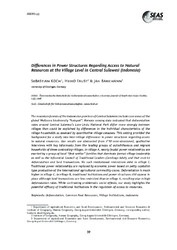Diff erences in Power Structures Regarding Access to Natural Resources at the Village Level in Central Sulawesi (Indonesia)
Koch, Sebastian
Faust, Heiko
Barkmann, Jan
1, 2: 59 - 81
Koch, Sebastian; Faust, Heiko; Barkmann, Jan, 2008: Diff erences in Power Structures Regarding Access to Natural Resources at the Village Level in Central Sulawesi (Indonesia). In: Koch, Sebastian; Faust, Heiko; Barkmann, Jan (2008): Diff erences in Power Structures Regarding Access to Natural Resources at the Village Level in Central Sulawesi (Indonesia), DOI: 10.23689/fidgeo-2802.
 |
Dokument öffnen: |
The mountain forests of the Indonesian province of Central Sulawesi include core areas of the
global Wallacea biodiversity “hotspot”. Remote sensing data indicated that deforestation
rates around Central Sulawesi’s Lore-Lindu National Park differ more strongly between
villages than could be explained by differences in the individual characteristics of the
village households as assessed by quantitative village censuses. This setting provided the
background for a study into inter-village differences in power structures regarding access
to natural resources. Our results are abstracted from 3*10 semi-structured, qualitative
interviews with key informants from the leading groups of autochthonous and migrant
households of three contrasting villages. In village A, nearly feudal power relationships are
exerted by a group of local “fi rst settler” families that dominate formal village leadership
as well as the infl uential Council of Traditional Leaders (Lembaga Adat), and that restrict
deforestation and land transactions. No such institutional restrictions exist in village C.
Traditional power relationships are replaced by economic power based on petty capitalisttype
production of the international agricultural commodity cocoa. Deforestation is much
higher in village C. In village B, traditional institutions and power structures still appear in
place although land transactions are less restricted than in village A, resulting also in high
deforestation rates. While contrasting problematic social effects, our study highlights the
potential effi cacy of traditional institutions in the regulation of access to resources.
Statistik:
ZugriffsstatistikSammlung:
- Geologie [931]

